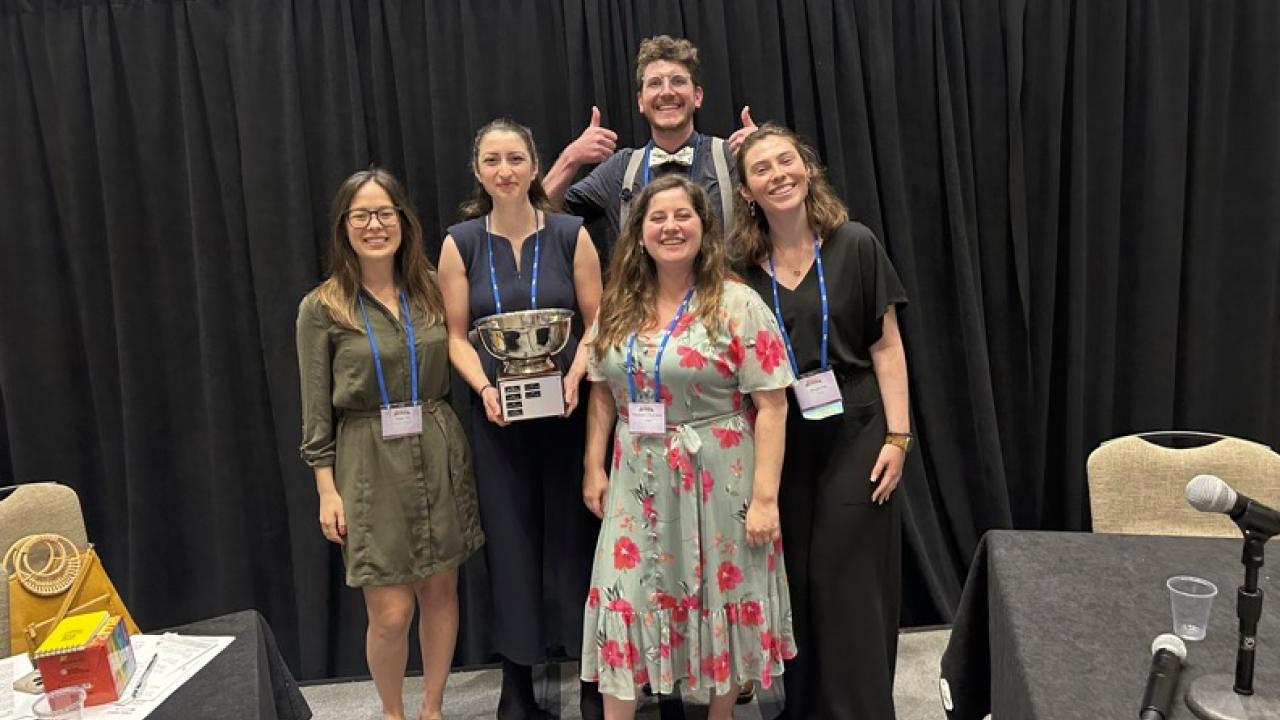
An archaeologist is called upon to lead an excavation in a war-torn region that her home country is invading. A graduate student working as a crew chief grapples with worker safety issues in a hostile environment. A scholar considers the notion of safeguarding data when her work is plagiarized by colleagues.
Such ethical scenarios are among the many that professional anthropologists and archaeologists deal with regularly. At the 89th Annual Meeting of the Society for American Archaeology, held in New Orleans last month, a team of UC Davis first-year graduate students won first place at the 19th Annual Ethics Bowl, a competition in which teams from different universities face off as they debate ethical dilemmas in the field.
“Archaeology and anthropology have a storied past of not always following the ethics that we strive for today and even some fairly racist foundations,” said Teresa Steele, a professor of anthropology and the faculty mentor of the UC Davis-winning team. “As disciplines, we really need to own up to that history and move ourselves forward by having very open conversations about these issues.”
The Society for American Archaeology Ethics Bowl is an avenue to do that while also providing burgeoning archaeologists the opportunity to consider these important questions and ideate ethical frameworks from the ground floor.
“We got the chance to have some really nice discussions with the other teams as well as audience members interested in ethics,” said Madison McCartin, a team member and anthropology graduate student. “One of the judges even invited us to help organize a future ethics bowl at the World Archaeological Congress.”
Additional members from the UC Davis Ethics Bowl team include anthropology graduate students Erin Mooneyham, Morgan Hall, Daniel Goring and Nikki Wu.
Reckoning with the past
To prepare for the Ethics Bowl, the UC Davis team spent months learning about various topics, international laws and ethical frameworks, including policies around repatriation, international excavation, archaeology in warzones, interpersonal dynamics in the field and indigenous perspectives, among others.
“One thing I would love to commend, especially Erin for, is that — even though there wasn’t necessarily a structured team captain — she was absolutely our team captain,” McCartin said. “We were really impressed by her ability to help us prepare so adequately for a competition that she had never participated in before.”
For Mooneyham, who specializes in zooarchaeology, her work and collaboration with the indigenous Alutiq communities of Kodiak Island, Alaska is a reminder of the checkered past of both anthropology and archaeology.
“Some of the first archaeology on Kodiak Island was done by a Smithsonian anthropologist, Ales Hrdlicka, who is notorious and well-hated by everyone because he excavated almost exclusively to find human burials and was only interested in taking human remains from these indigenous communities and putting them in his museum.”
According to The Washington Post, Hrdlicka’s excavations on Kodiak Island “amounted to industrial-scale pillaging.” With a small team, he “disinterred the remains of about 1,000 people.”
While the majority of Hrdlicka’s work on Kodiak Island occurred during the 1930s, the community and today’s scholars are still reckoning with those actions from nearly 100 years ago. These echoes inform how Mooneyham and her colleagues conduct their research.
“We don’t want to just abide by legal codes and do what’s mandated by law, we want to think ethically,” Mooneyham said. “Communities have had anthropologists and archaeologists come in, sit with them, write about them, take their resources, eat their food and then just leave and never see them again. We don’t want to be those people.”
“We have to think about, how are we serving this community?” she added. “What do they want? What do they need? And how can our research serve that community in some way?”
The debate stage
About six weeks before the Ethics Bowl, all participating teams were sent 10 hypothetical cases to review. During the competition, cases were selected at random and then debated by competing teams.
“We exhaustively dissected the arguments and selected the best way to present our stances,” McCartin said. “We also practiced answering questions on the fly and developing counter questions for the opposing team. A final aspect of preparation was to conduct a practice ethics bowl with our department and get some external feedback.”
Steele is hopeful that the practice ethics bowl, which was held in a colloquium setting, will create a space for open dialogue about ethical frameworks within the Department of Anthropology.
“These wider discussions are really important for professional development, for progressing the culture of the discipline, to make all of this really at the forefront and something we should all be thinking about and incorporating.”
Thanks to their performance at the event, the UC Davis team was invited to help organize a future ethics bowl at the World Archaeological Congress, an international annual event that acts as a forum for all things related to the past. Additionally, McCartin and Mooneyham will co-chair a session related to ethics in zooarchaeology for the Society for American Archaeology next year in Denver.
“Within our team, we can all say that our appreciation for the nuance of archaeological ethics has increased ten-fold and is something we intend to pursue in the future,” McCartin said.
